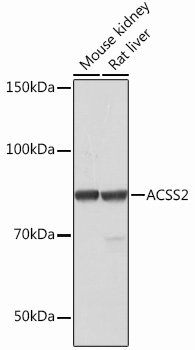Cell Biology Antibodies 14
Anti-ACSS2 Antibody (CAB12334)
- SKU:
- CAB12334
- Product Type:
- Antibody
- Reactivity:
- Human
- Reactivity:
- Mouse
- Reactivity:
- Rat
- Host Species:
- Rabbit
- Isotype:
- IgG
- Antibody Type:
- Monoclonal Antibody
- Research Area:
- Cell Biology
Description
| Antibody Name: | Anti-ACSS2 Antibody |
| Antibody SKU: | CAB12334 |
| Antibody Size: | 20uL, 50uL, 100uL |
| Application: | WB |
| Reactivity: | Human, Mouse, Rat |
| Host Species: | Rabbit |
| Immunogen: | A synthesized peptide derived from human ACSS2 |
| Application: | WB |
| Recommended Dilution: | WB 1:500 - 1:2000 |
| Reactivity: | Human, Mouse, Rat |
| Positive Samples: | HepG2, Mouse kidney, Rat liver |
| Immunogen: | A synthesized peptide derived from human ACSS2 |
| Purification Method: | Affinity purification |
| Storage Buffer: | Store at -20°C. Avoid freeze / thaw cycles. Buffer: PBS with 0.02% sodium azide, 0.05% BSA, 50% glycerol, pH7.3. |
| Isotype: | IgG |
| Sequence: | Email for sequence |
| Gene ID: | 55902 |
| Uniprot: | Q9NR19 |
| Cellular Location: | |
| Calculated MW: | 79kDa |
| Observed MW: | 79KDa |
| Synonyms: | ACAS2, ACECS, ACS, ACSA, dJ1161H23.1 |
| Background: | This gene encodes a cytosolic enzyme that catalyzes the activation of acetate for use in lipid synthesis and energy generation. The protein acts as a monomer and produces acetyl-CoA from acetate in a reaction that requires ATP. Expression of this gene is regulated by sterol regulatory element-binding proteins, transcription factors that activate genes required for the synthesis of cholesterol and unsaturated fatty acids. Alternative splicing results in multiple transcript variants. [provided by RefSeq, Jul 2009] |
| UniProt Protein Function: | ACSS2: Activates acetate so that it can be used for lipid synthesis or for energy generation. Monomer. Belongs to the ATP-dependent AMP-binding enzyme family. |
| UniProt Protein Details: | Protein type:Carbohydrate Metabolism - pyruvate; Carbohydrate Metabolism - propanoate; Carbohydrate Metabolism - glycolysis and gluconeogenesis; EC 6.2.1.1; Ligase Chromosomal Location of Human Ortholog: 20q11.22 Cellular Component: cytoplasm; cytosol; intracellular membrane-bound organelle; nucleoplasm Molecular Function:acetate-CoA ligase activity; AMP binding Biological Process: ethanol oxidation; lipid biosynthetic process |
| NCBI Summary: | This gene encodes a cytosolic enzyme that catalyzes the activation of acetate for use in lipid synthesis and energy generation. The protein acts as a monomer and produces acetyl-CoA from acetate in a reaction that requires ATP. Expression of this gene is regulated by sterol regulatory element-binding proteins, transcription factors that activate genes required for the synthesis of cholesterol and unsaturated fatty acids. Alternative splicing results in multiple transcript variants. [provided by RefSeq, Jul 2009] |
| UniProt Code: | Q9NR19 |
| NCBI GenInfo Identifier: | 20137525 |
| NCBI Gene ID: | 55902 |
| NCBI Accession: | Q9NR19.1 |
| UniProt Secondary Accession: | Q9NR19,Q5QPH2, Q5QPH3, Q8N238, Q96EL0, Q9NQP7, Q9UJ15 A6NE90, |
| UniProt Related Accession: | Q9NR19 |
| Molecular Weight: | 80,087 Da |
| NCBI Full Name: | Acetyl-coenzyme A synthetase, cytoplasmic |
| NCBI Synonym Full Names: | acyl-CoA synthetase short-chain family member 2 |
| NCBI Official Symbol: | ACSS2 |
| NCBI Official Synonym Symbols: | ACS; ACSA; ACAS2; ACECS; dJ1161H23.1 |
| NCBI Protein Information: | acetyl-coenzyme A synthetase, cytoplasmic |
| UniProt Protein Name: | Acetyl-coenzyme A synthetase, cytoplasmic |
| UniProt Synonym Protein Names: | Acetate--CoA ligase; Acetyl-CoA synthetase; ACS; AceCS; Acyl-CoA synthetase short-chain family member 2; Acyl-activating enzyme |
| Protein Family: | Acetyl-coenzyme A synthetase |
| UniProt Gene Name: | ACSS2 |
| UniProt Entry Name: | ACSA_HUMAN |







